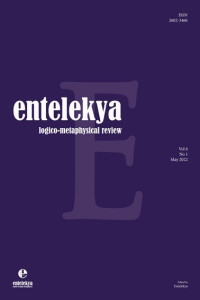Öz
Kaynakça
- Atasoy, Fahri. “Kültürler Üzerinde Bilişim Devriminin Etkileri.” Modern Türklük Araştırma Dergisi 4, no. 2 (2007): 163–78.
- Bayraktar, Levent. Türk Düşüncesinden Portreler. Ankara: Aktif Düşünce Yayıncılık, 2014.
- Bynum, Terrell Ward. “Aristotle’s Theory of Human Action.” The City University of New York, 1986.
- Bynum, Terrell Ward. “Flourishing Ethics.” Ethics and Information Technology, no. 8 (2006): 157–73.
- Campbell, Jeremy. Grammatical Man: Information, Entropy, Language, and Life. New York: Simon & Schuster, 1982.
- Kantar, Nesibe. “A Looking for a Philosophy Ethical Perspective to Solve Ethical Problems in Information and Communication Technologies (ICT).” Presented at the VII. International European Conference on Social Sciences, Antalya, 2022.
- Kantar, Nesibe. “An Information Ethics Theory in the Context of Information Philosophy: Flourishing Ethics.” Ankara Yıldırım Beyazıt University, 2021.
- Kantar, Nesibe. “Bilişim Çağında Felsefe ve Etiği Yeniden Düşünmenin Gerekliliği.” Presented at the I. Ahi Evran Uluslararası Bilimsel Araştırmalar Kongresi, Kırşehir, 2021.
- Kantar, Nesibe, and Terrell Ward Bynum. “Global Ethics for the Digital Age: Flourishing Ethics.” Journal of Information, Communication and Ethics in Society 19, no. 3 (2021): 329–44.
- Wiener, Norbert. The Human Use of Human Beings: Cybernetics and Society. New York: Doubleday & Company, 1954.
- Witzgall, Susanne, and Kerstin Stakemeier. Power of Material/Politics of Materiality. Zurich: Diaphanes, 2014.
Öz
Like all other inventions, advances in the field of digital computational technologies, which we will briefly describe as the information world, have also played an essential role in humanity life. These advances have brought some ethical debates to our individual and social life, as well as the industrial benefit obtained by the digital and analog technological developments that positively or negatively affect and transform all economic and cultural paradigms surrounding human life. The branch of the philosophy of information, which questions the basic issues and discussions of the information age through philosophical paradigms, deals with the ontological, epistemological, and axiological problems of the information age. The subject deals with the analysis and new results of an Aristotelian information ethics theory, which is a theory first proposed to the world of thought in the field of the philosophy of information. The main reason for dealing with this subject in the thesis is to examine the scientific, technological, and philosophical bases of the information revolution.
Anahtar Kelimeler
Information ethics philosophy of information entropy flourishing ethics cybernetics and technology artificial intelligence
Kaynakça
- Atasoy, Fahri. “Kültürler Üzerinde Bilişim Devriminin Etkileri.” Modern Türklük Araştırma Dergisi 4, no. 2 (2007): 163–78.
- Bayraktar, Levent. Türk Düşüncesinden Portreler. Ankara: Aktif Düşünce Yayıncılık, 2014.
- Bynum, Terrell Ward. “Aristotle’s Theory of Human Action.” The City University of New York, 1986.
- Bynum, Terrell Ward. “Flourishing Ethics.” Ethics and Information Technology, no. 8 (2006): 157–73.
- Campbell, Jeremy. Grammatical Man: Information, Entropy, Language, and Life. New York: Simon & Schuster, 1982.
- Kantar, Nesibe. “A Looking for a Philosophy Ethical Perspective to Solve Ethical Problems in Information and Communication Technologies (ICT).” Presented at the VII. International European Conference on Social Sciences, Antalya, 2022.
- Kantar, Nesibe. “An Information Ethics Theory in the Context of Information Philosophy: Flourishing Ethics.” Ankara Yıldırım Beyazıt University, 2021.
- Kantar, Nesibe. “Bilişim Çağında Felsefe ve Etiği Yeniden Düşünmenin Gerekliliği.” Presented at the I. Ahi Evran Uluslararası Bilimsel Araştırmalar Kongresi, Kırşehir, 2021.
- Kantar, Nesibe, and Terrell Ward Bynum. “Global Ethics for the Digital Age: Flourishing Ethics.” Journal of Information, Communication and Ethics in Society 19, no. 3 (2021): 329–44.
- Wiener, Norbert. The Human Use of Human Beings: Cybernetics and Society. New York: Doubleday & Company, 1954.
- Witzgall, Susanne, and Kerstin Stakemeier. Power of Material/Politics of Materiality. Zurich: Diaphanes, 2014.
Ayrıntılar
| Birincil Dil | İngilizce |
|---|---|
| Konular | Felsefe |
| Bölüm | Article |
| Yazarlar | |
| Yayımlanma Tarihi | 30 Mayıs 2022 |
| Yayımlandığı Sayı | Yıl 2022 Cilt: 6 Sayı: 1 |

